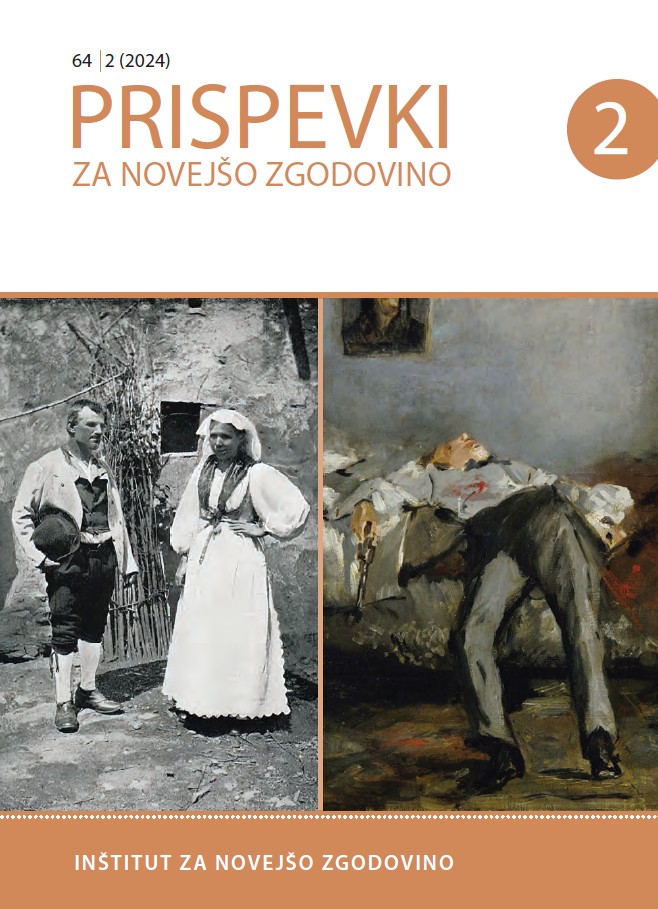Land Tenure Reforms in the Area of Leskovac after the Treaty of Berlin (1878–1882)
DOI:
https://doi.org/10.51663/pnz.64.2.02Keywords:
Leskovac, land tenure, Muslim property, agrarian relations, SerbiaAbstract
After the Treaty of Berlin (1878), the area of Leskovac became a part of Serbia. With the fall of the Ottoman empire, the Muslim population also departed leaving their properties. Abandoned lands were taken by the local Christians, who had been in feudal relationships with previous owners. The article follows the politics of the Serbian government regarding the issues of ownership and compensation to Muslim landowners. Furthermore, concrete cases of land possession legal disputes between local Serbs and the former proprietors will be presented. The research compares different political and social structures before and after the Treaty of Berlin. Also, it points out the peasants' new economic situation after the liberation from the feudal system. Analysing the unpublished and published documents, with the help of periodicals and literature, the article provides the new insights and views into the studies of the rural history of Serbia and Southeastern Europe in the 19th century
References
Dimitrijević, Sergije. Agrarni odnosi za vreme Turaka u Leskovačkom kraju. Leskovac: Narodni muzej, 1951. (Serbian Cyrillic)
Đorđević, Miroslav R. „Inostrani komentari zakona o uređenju agrarnih odnosa u novooslobođenim krajevima Srbije od 1880. godine.“ Leskovački zbornik 18 (1978): 57–75. (Serbian Cyrillic)
Id. Evropa i jug Srbije posle Berlinskog kongresa. Leskovac: Narodni muzej, 1992. (Serbian Cyrillic)
Jagodić, Miloš. Naseljavanje Kneževine Srbije 1861-1880. Beograd: Istorijski institut, 2004. (Serbian Cyrillic)
Id. „Međunarodni aspekt agrarnog pitanja u Srbiji (1880–1882).“ In Pirot – od turske kasabe do modernog grada, preko Berlina i Versaja. Zbornik radova, edited by Miloš Jagodić, 85–95. Pirot: Istorijski arhiv, 2018. (Serbian Cyrillic)
Id. „Prilog proučavanju agrarnih odnosa u Niškom sandžaku sredinom 19. veka.“ Srpske studije 8 (2017): 312–19. (Serbian Cyrillic)
Jovanović, Jovan V. „Iz istorije agrarne svojine u Leskovačkom porečju.“ Leskovački zbornik 1 (1961): 28–32. (Serbian Cyrillic)
Id. „Leskovačko porečje. Antropogeografska i sociološka studija.“ In Dubočica. Naselja. Poreklo stanovništva. Običaji, edited by Borisav Čeliković, 8–276. Beograd: Službeni glasnik, Srpska akademija nauka i umetnosti, 2019. (Serbian Cyrillic)
Id. „Leskovačko polje i Babička gora. Istorijsko-privredna i etnografsko-sociološka istraživanja.“ In Dubočica, 277–765. (Serbian Cyrillic)
Id. „Poslednje age i begovi u Leskovačkom porečju.“ Leskovački zbornik 3 (1963): 143–51. (Serbian Cyrillic)
Kolaj Ristanović, Irena. Status vakufskih dobara u Kneževini Srbiji (1878–1882). Prilog proučavanju osmanske baštine. Beograd: Filip Višnjić, Društvo za urbanu istoriju, 2020. (Serbian Cyrillic)
Nikolić–Stojančević, Vidosava. Leskovac i oslobođeni krajevi Srbije 1877–1878. godine. Etničke, demografske, socijalno-ekonomske i kulturne prilike. Leskovac: Biblioteka Narodnog muzeja, 1975. (Serbian Cyrillic)
Id. „Leskovac i leskovački kraj u prvim godinama posle oslobođenja od Turaka.“ Leskovački zbornik 18 (1978): 129–201. (Serbian Cyrillic)
Nedeljković, Branislav M. Istorija baštinske svojine u Novoj Srbiji od kraja 18 veka do 1931. Beograd: Izdavačko i knjižarsko preduzeće Geca Kon, 1936. (Serbian Cyrillic)
Radović, Danijel. Jovan Ristić (1829–1899): biografija srpskog državnika. Prometej: Novi Sad, 2023. (Serbian Cyrillic)
Rajić, Suzana. Spoljna politika Srbije. Između očekivanja i realnosti 1868–1878. Beograd: Srpska književna zadruga, 2015. (Serbian Cyrillic)
Savić, Aleksandar M. Kneževina Srbija i Osmansko carstvo (1839–1858): doktorska disertacija. Beograd: Univerzitet u Beogradu, Filozofski fakultet, 2021. (Serbian Cyrillic)
Spasić, Milovan. „Podatci o agrarnim odnosima hrišćana u oslobođenim krajevima, okruga topličkog i vranjskog, za vreme turske vladavine.“ Glasnik Srpskog učenog društva 71 (1890): 219–58. (Serbian Cyrillic)
Stojančević, Vladimir. Leskovac i leskovačka nahija u XIX veku (1804–1878). Leskovac: Biblioteka Narodnog muzeja, 1987. (Serbian Cyrillic)
Id. „Otkup vakufskih imanja u Leskovcu posle oslobođenja 1878. godine.“ Leskovački zbornik 12 (1972): 135–39. (Serbian Cyrillic)
Stojičić, Slobodanka. Agrarno pitanje u novooslobođenim krajevima Srbije posle srpsko-turskih ratova 1878 – 1907. Pravni i politički aspect. Leskovac: Biblioteka Narodnog muzeja, 1987. (Serbian Cyrillic)
Id. „Drugo odeljenje suda okruga niškog sa sedištem u Leskovcu.“ Leskovački zbornik 14 (1974): 177–92. (Serbian Cyrillic)
Terzibaşoğlu, Yücel. „Landed Estates, Rural Commons and Collective Agriculture in Ottoman Niş and Leskofçe in the Nineteenth Century.“ Turkish Historical Review 13 (2022): 343–71, https://doi:10.1163/18775462-bja10036
Trajković, Dragoljub. „Oko Leskovačkog zakona od 27. zilkade 1275. godine.“ Leskovački zbornik 4 (1964): 137–41. (Serbian Cyrillic)
Trebješanin, Radoš. „Leskovac posle oslobođenja 1877. god.“ Leskovački zbornik 18 (1978): 279–93. (Serbian Cyrillic)
Filipović, Milenko S. „Agrarno-pravni odnosi zvani paraspor ili paraspur.“ Leskovački zbornik 5 (1965): 5–15. (Serbian Cyrillic)
Šešum, Uroš S. Srbija i Stara Srbija (1804–1839). Beograd: Filozofski fakultet, Univerzitet u Beogradu, 2017. (Serbian Cyrillic)
Downloads
Published
Issue
Section
License
Copyright (c) 2024 Miroslav Radivojević

This work is licensed under a Creative Commons Attribution 4.0 International License.
Authors who publish with this journal agree to the following terms:
- Authors retain copyright and grant the journal right of first publication with the work simultaneously licensed under a Creative Commons Attribution License that allows others to share the work with an acknowledgement of the work's authorship and initial publication in this journal.
- Authors are able to enter into separate, additional contractual arrangements for the non-exclusive distribution of the journal's published version of the work (e.g., post it to an institutional repository or publish it in a book), with an acknowledgement of its initial publication in this journal.
- Authors are permitted and encouraged to post their work online (e.g., in institutional repositories or on their website) prior to and during the submission process, as it can lead to productive exchanges, as well as earlier and greater citation of published work (See The Effect of Open Access).


